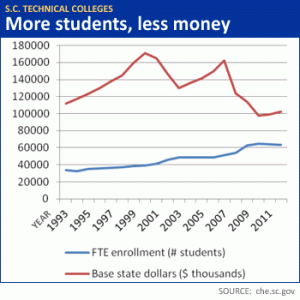One of the state’s most powerful lobbying groups and voices for the business community, the S.C. Chamber of Commerce, has made workforce development a top agenda item of the coming legislative session.
![]() In its 2015 Competitiveness Agenda, the chamber has called upon the legislature to address “critical needs” jobs created by a resurgent manufacturing sector that require more than a GED but less than a Ph.D.
In its 2015 Competitiveness Agenda, the chamber has called upon the legislature to address “critical needs” jobs created by a resurgent manufacturing sector that require more than a GED but less than a Ph.D.
In short, the chamber is pushing for to improve workforce development in the state’s already fairly robust technical college system.
Why? The chamber is concerned South Carolina is falling behind in its ability to fill these jobs, citing a state report that says 54 percent of jobs in the workforce are falling into the “critical needs” category but with only 28 percent of residents having the skills to fill those jobs.
While the chamber will push for many legislative items in the coming legislative session, it will also focus much of its collective power on “our state’s most important asset — our workforce and its future development,” according to Mikee Johnson, the chamber’s chairman for the current fiscal year and chief executive officer of Cox Industries.
This is not a new position for the chamber. It has championed workforce preparedness in years past, be it in the form of asking for higher taxes for better public K-12 schools to increased higher education funding.
Technically speaking
Hope Rivers, vice president for student and academic affairs for the S.C. Technical College System, said there’s an even split currently in the roughly 250,000 students attending tech schools: half are taking classes for college credit and the other half in work-related continuing education.
 Rivers said the challenge has been, especially after the number of students the system handles surged mightily during the Great Recession, to try “and keep up with the technology of the real factory floors” across the state.
Rivers said the challenge has been, especially after the number of students the system handles surged mightily during the Great Recession, to try “and keep up with the technology of the real factory floors” across the state.
Gone is the manufacturing base of yore in South Carolina in which men and women risked fingers and more in textile mills’ click-clack rooms. Today’s manufacturing paradigm has evolved into a much more 21st century endeavor.
Boeing has been the 400-pound gorilla in the workforce development arena since it opened in North Charleston five years ago, an example that good jobs and an improved tax base are possible through tech-heavy manufacturing jobs.
Critical thinking important, too
But there some in the state, such as economist Holley Ulbrich, who hope support for workforce preparedness extends to primary and secondary schools. Ulbrich notes that the state’s past manufacturing base quickly eroded when textile companies left the country for cheaper pastures in Latin America and Southeast Asia.
Ulbrich, a distinguished emeritus scholar at Clemson’s Strom Thurmond Institute, noted that tire manufacturing, a burgeoning industry in South Carolina, may not be as tech-heavy as building the planes of tomorrow, and that those jobs could go the way of textile jobs in the not-too-distant future.
As such, Ulbrich, whose brother went to vocational school, said some of the workforce development focus needed to remain on building critical-thinking skills in K-12 students.
Bernadette Hampton, president of the S.C. Education Association, an education watchdog and lobbying group, said she hoped the legislature would link its support of both K-12 and technical schools.
Holistic approach
Hampton also said the legislature needed to make sure it focus was in all the zip codes of the state, that kids from everywhere “be they from Allendale County or Charleston County” get an education that could lead to a Boeing-style job.
A holistic approach already seems to gaining traction with the chamber, as its board chair Johnson state recently that the idea of ‘”cradle to career” encompasses education at all levels.
“We believe the optimization of our workforce will not only be a core component of improving our infrastructure, but also the quality of life for all facets of South Carolina,” Johnson said.
















 We Can Do Better, South Carolina!
We Can Do Better, South Carolina!